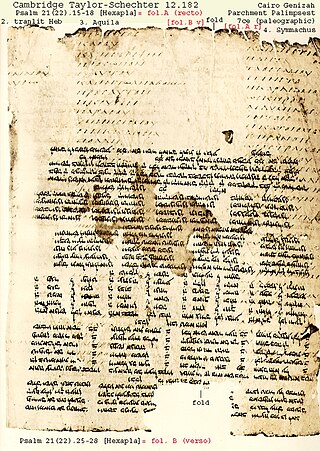Loading AI tools
7th-century manuscript of Origen's Hexapla From Wikipedia, the free encyclopedia
The siglum Taylor-Schechter 12.182 (T-S 12.182; also referenced as TM nr. 62326; LDAB id: 3490; Rahlfs 2005) designates a manuscript written on parchment in codex form.[1] This is a palimpsest of a copy of Origen's work called the Hexapla. The manuscript is dated to 7th-century AD,[2] and is the oldest of the hexapla manuscripts.[3] The hexapla was completed before 240 AD.

The fragments comes from Egypt, were published by C. Taylor in his work Hebrew-Greek Cairo Genizah Palimpsests, Cambridge, 1900, pp. 54–65.[4]
This is palimpsest in codex form written on parchment. It contains Psalms 22 (LXX 21): 15-18 fol. A recto, 19-24 and 25-28 fol. B verso, and the middle columns, 2-5 columns of the Hexapla.[5][6]
The manuscript is written in koine Greek, and the divine name is notable, it contains the tetragrammaton in Greek characters "Pipi" (ΠΙΠΙ). According to Jerome, some septuagint manuscripts had the Divine Name written in this way. Jerome mentions that some Greek manuscripts contain the Hebrew letters YHWH (יהוה),[7] he also comments that this Hebrew could mislead some Greek readers to read YHWH as "Pipi" (ΠΙΠΙ), since the letters YHWH (read right to left) look like "Pi Iota Pi Iota" (read left to right) in Greek.[8] According to Pavlos D. Vasileiadis and Nehemiah Gordon, the manuscript has "the nomen sacrum κ[ύριε] with a supralinear Hebrew yod for יהוה (YHWH), followed by πιπι. This transitional combination represents the Tetragrammaton in Ps 22:20 [LXX 21:20] in three separate ways in the Septuagint column of Origen’s Hexapla, preserved in a palimpsest in the Cairo Genizah."[9]
Today it is kept at the Library of the University of Cambridge as a part of the Taylor-Schechter Cairo Genizah Collection (Cambridge University Library T-S 12.182).
Seamless Wikipedia browsing. On steroids.
Every time you click a link to Wikipedia, Wiktionary or Wikiquote in your browser's search results, it will show the modern Wikiwand interface.
Wikiwand extension is a five stars, simple, with minimum permission required to keep your browsing private, safe and transparent.